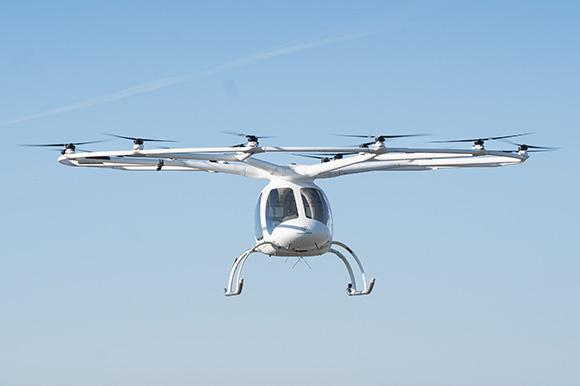
Volocopter’s 2X eVTOL prototype has conducted flight tests in Paris as well as Germany and Singapore,
Public exposure to electric vertical-takeoff-and-landing aircraft remains rare but, weather permitting, visitors to NBAA-BACE in Las Vegas will have the opportunity to witness crewed flights of Volocopter’s 2X prototype at Henderson Executive Airport.
This will mark Volocopter’s return to Las Vegas, where its earlier VC200 prototype appeared on stage at the 2018 Consumer Electronics Show and made a brief indoor flight capping the keynote speech by the CEO of Intel, an early investor in the German startup.
Volocopter flew the 2X at the AirVenture Oshkosh show in 2021 marking its outdoor flight debut in the U.S. In September, the company announced an agreement with global helicopter operator Bristow Group to develop passenger and cargo services with its eVTOL aircraft in the U.S as well as the UK.
The 2X is the predecessor to the two-seat VoloCity now in testing in Germany. Volocopter is aiming for European certification by mid-2024 but has yet to begin piloted flights of a conforming aircraft. Delays in the supply of qualified electric engines could delay type certification, Bloomberg reports, and force the company to obtain a special permit to launch commercial service at the 2024 Paris Olympics as planned.
Whether electric and hydrogen propulsion can find a place in business aviation is not clear but Wisk Aero, now a Boeing subsidiary, is returning to NBAA-BACE, this time bringing a full-scale mockup of its sixth-generation autonomous eVTOL air taxi, which is expected to fly in 2024. Another new aircraft planned to appear in full-size model form is French startup VoltAero’s hybrid-electric Cassio 330.
Wisk is embarked on an ambitious path direct to autonomous air taxis, for safety and economy, and aims to launch service before the end of the decade. The startup has begun test fights at Long Beach Airport, California, with its fifth-generation aircraft as it works to integrate self-flying air taxis into busy airports.
VoltAero is taking a stepwise approach to introducing new propulsion technology to general aviation. The Cassio 330 is planned to fly in early 2024 powered by a modified Kawasaki motorcycle engine. Then the startup plans to add the Electric Power Systems battery and Safran electric motor to produce the hybrid configuration. In parallel, VoltAero will test the Kawasaki engine on hydrogen with the intent of offering a zero-emission version of the Cassio fueled by liquid hydrogen.
